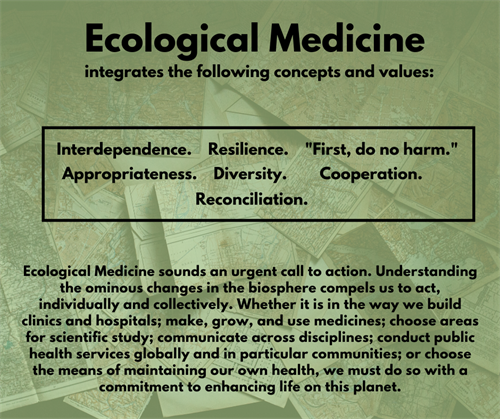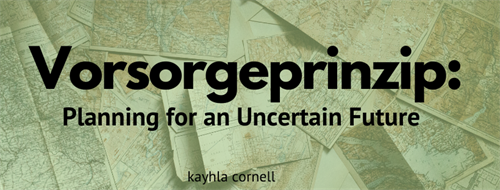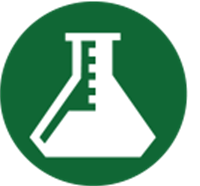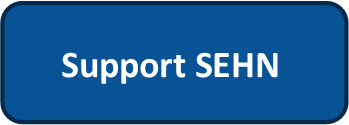|
Carolyn Raffensperger, SEHN executive director, coined the term "Ecological Medicine" in 2001 for a new field of inquiry and action to reconcile the care and health of ecosystems, populations, communities, and individuals. In this issue we look at the principles of ecological medicine and their implications during the Coronavirus. We tell two stories, both looking more carefully at the story of the von Moltke family legacy and the Kreisau Ciricle in Germany during World War 2 - another time people examined the role of government in a crisis. We also share with you an assessment of government’s approach to this public health crisis by Joseph Guth, SEHN fellow. Finally, you will find two downloadable resources including a study guide about the role of government and a free pdf of the book “Ecological Medicine” published by Bioneers.”
- Vorsorgeprinzip: Planning for an Uncertain Future op-ed discussing helplessness and our role in planning what our society looks like after the coronavirus.
- A handbook: Forecaring: a constellation of ideas on the Commons, Free, Prior and Informed Consent, the Public Trust theory of Government, the Precautionary Principle, and Guardianship of Future Generations.
- The Weakness and Incompetence of Today's American Government is Not an Accident by Joseph Guth, SEHN Fellow.
- 2004 Bioneers book: Ecological Medicine: Healing the Earth, Healing Ourselves.
|
Table of Contents
V. SEHN in the News
|
|
|
Friends of SEHN,
“I believe that the community - in the fullest sense: a place and all its creatures - is the smallest unit of health and that to speak of the health of an isolated individual is a contradiction in terms."
-Wendell Berry
The coronavirus is a clarion call to make public health central to the social contract and a key mandate of government at every level, local, state and federal. The experiment of having the market solve all problems has failed. The health care system is broken. The environment has been trashed. Neo-liberal billionaires have ransacked government in the name of some illusory “freedom”. We have forgotten that we are responsible to and for each other.
What would it mean if public health was restored to its rightful place as a key responsibility of government? What would our policies look like if we focused on preventing disease and fostering the conditions for health?
As a first order of business, we would recognize the central role the environment plays in public health. Disturbed bat habitat and disruption of human food systems in China appear to be the source of the Coronavirus. However, conditions in places like Iowa (the most ecologically damaged state in the Union) are ripe for zoonotic diseases like Covid-19. Those conditions include hogs and chickens packed into unhealthy close quarters in factory farms. Those animals pollute the water and air with liquid manure and aerosolized fecal dust carrying antibiotic resistant bacteria as well as viruses. The famous Spanish flu of 1918 probably began on a Kansas hog farm .
Years ago, a diverse group of people with broad expertise in public health, medicine and ecology gathered to develop a consensus around the basic idea that our health was rooted in the natural world and issue a call to action. We called this “ecological medicine” and said:
“Ecological Medicine sounds an urgent call to action. Understanding the ominous changes in the biosphere compels us to act, individually and collectively. Whether it is in the way we build clinics and hospitals; make, grow, and use medicines; choose areas for scientific study; communicate across disciplines; conduct public health services globally and in particular communities; or choose the means of maintaining our own health, we must do so with a commitment to enhancing life on this planet.”
As goes the Earth, so goes humanity. We have just discovered the hard way that if we shrink wildlands or crowd animals in feed lots, we are going to get outbreaks of devastating diseases. If we treat public health as an after-thought and make health care a privilege for the wealthy and employed, we will destroy the basic infrastructure on which our society depends.
SEHN is co-convening a project with True North called the Big Rethink. We aim to trace the history of how we got to this point where public health is sacrificed on the altar of the economy, and to design a way forward that restores a robust democracy, effective government and a healthy world. Covid-19 is our wake-up call. There is no snooze button.
Carolyn Raffensperger
Executive Director
“ He put the question to me explicitly- ‘the time is coming when something must be done. I would like to have a hand in it, but I can only do so if you join in too,” and I said, ‘Yes, it’s worth it.”
-Freya von Moltke
At SEHN we work on the precipice of uncertainty; protecting a livable future amongst the unknown. Now, more than ever, we feel the weight of this responsibility for future generations as we live through one of the greatest unknowns in modern times. SARS-CoV-2, the novel coronavirus, has shone a brutal spotlight on injustice, inequality, unpreparedness, ignorance, the fragility of a growth-obsessed economy, and the necessity for our government to act in the interest of public health.
Studies of human psychology provide overwhelming evidence of widespread feelings of helplessness in a crisis. Aside from our collective anxiety, we feel helpless; we have no control over the situation and many of us, the non-essential workers, feel as though we can’t do anything to help . In fact, the most help we can be right now is to do nothing at all; to stay home and out of the way.
But we aren’t helpless, there’s a lot we can do right now to prevent future suffering and harm. It seems overwhelming, to plan for a future amid complete chaos, but we won’t be the first to have done it.
In the 1940s a group of men and women of different backgrounds, religions, and political leanings gathered together at the estate of Count Helmuth and Freya von Moltke and planned for the future of Germany, for the time after Hitler and the Nazi regime were removed from power. They were planning for a brighter, better future while still living through the atrocities of Hitler and the Third Reich. The members of this clandestine “think tank”, the Kreisau Circle, discussed academics, politics, history, literature, human connection, the role of government, and what good governance could look like.
The von Moltkes and the Kreisau Circle knew hard times, had to wait through hard times, but they were not idle. They wisely drafted plans for what needed to take place after Hitler was removed from power; they were prepared for a transition that would benefit all Germans and through their waiting, drafting, and planning for an uncertain future- they figured out what role their government needed to fulfill to best serve its people. READ MORE
|
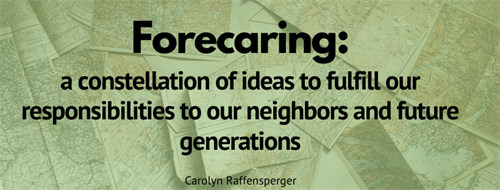 |
|
Many years ago when we began working on the precautionary principle, a core concept of the Women’s Congress for Future Generations, we traced the idea back to its origin. The words “precautionary principle” were translated out of a lovely German word Vorsorgeprinzip by Konrad Von Moltke at a meeting of Greenpeace in Europe. The literal translation of Vorsorgeprinzip, according to Nancy Myers, the multi-lingual then communications director of SEHN, is “forecaring”. Forecaring is a complex idea that means caring about and preparing for what might be a difficult future.
Von Moltke knew hard times. His father, Helmut James Graf Von Moltke had been part of the German resistance during WWII and was executed by the Nazis for treason. He and his wife Freya belonged to an anti- Nazi resistance group, called the Kreisau Circle . The Kreisau Circle, had been anticipating the fall of Hitler and had been working on “moral and democratic principles” that could form the basis of a post-Nazi Germany.
The concept of the precautionary principle is rooted in the kind of resistance and future-oriented thinking that was exemplified by those trying to stop Hitler’s atrocities: what lies on the other side of the hard times? How do we get through this and prepare for the future?
As I write this, the difficult future is here. Everywhere we turn we are faced with fire and floods, racial violence and increasing patterns of diseases in our most vulnerable communities. The old ideas of economic growth for its own sake, government by and for corporations, acceptable risk rather than preventing harm have led to a level of suffering and catastrophe that a decade ago were unimaginable.
The Women’s Congress stands for the proposition that we have a responsibility to prevent suffering and harm if we can. Prevention is a future-oriented idea. The Congress affords us an opportunity to examine the ideas that we use as navigational tools as we head towards that future. We believe that the crises of our days and the threat to a livable future require that we use a moral compass to find our way forward. Our grandchildren deserve this. Our neighbors’ grandchildren deserve this. We owe it to them.
** This essay is a foreword to an entire handbook on applying the principles of Commons, Free, Prior and Informed Consent, the Public Trust theory of Government, the Precautionary Principle, and Guardianship of Future Generations, in your community. ACCESS THE FORECARING HANDBOOK HERE
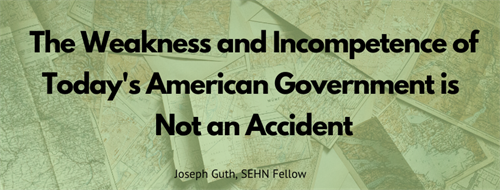 |
|
As the daily news makes painfully obvious, today’s American government is unable to respond effectively to the COVID-19 epidemic. The denial of scientific fact, disregard of intelligence, consequences of relentless budget cuts, and the current Administration’s unwillingness to deploy its Constitutional power to organize a National response have been laid bare to all the world.
But this is not an aberration. It is not inevitable or due to an unforeseeable catastrophe or attributable solely to the failings of the Trump administration.
We are now living in the weakened America that has been intentionally engineered over the past four decades by American corporations and super-rich individuals. In this America, government at all levels has become structured to serve those interests. The Nation has lost the political, legal and institutional structures necessary for government to act in the broader public interest. What is left is the ineffectual, incompetent, resource-poor, distrusted, and confused government now struggling before our eyes.
How did we get here? American business has long resisted government’s efforts to promote the public welfare. [1] But the comprehensive program that has brought us today’s American government was first laid out in the now-famous “Powell Memorandum,” commissioned by the U.S. Chamber of Commerce in 1971. [2] It was written by Lewis F. Powell, Jr., a prominent corporate and tobacco industry lawyer named later that year to the U.S. Supreme Court by President Nixon.
The Powell Memorandum mapped out a program for American business to gain control of and dominate the American government for one purpose: to promote and defend what Powell called “capitalism” and equated with the “free enterprise system” and the “profit system.” The program was detailed and comprehensive. It explicitly called on American business to act by: READ MORE
|
|
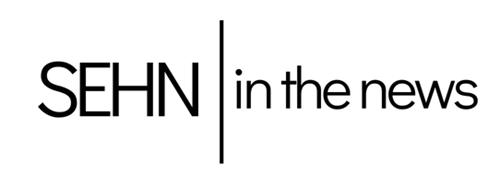
|
On May 4 SEHN’s Science Director Ted Schettler will participate in a virtual conference sponsored by the Green Science Policy Institute as part of their Six Chemical Classes Toxic Reduction project. This session is “Antimicrobials in the Time of Coronavirus”. Speakers are:
Ted Schettler, Science Director, Science & Environmental Health Network
Anne-Cooper Doherty, Senior Env. Scientist, DTSC Safer Consumer Products Program; CalEPA
Rolf Halden, Professor, Arizona State University.
Talks by the three panelists have been pre-recorded, and Ted’s is available here. The others will be available after May 4.
|
|
|
|
|
SEHN Executive Director Carolyn Raffensperger was featured on the Bioneers website last month with her latest guest post, "Community Resilience in the Light of the Coronavirus."
In this guest post, Carolyn calls on us to face the coronavirus pandemic by empowering our communities, helping others, and caring for our neighbors during this turbulent time.
Click here to read the article.
|
|
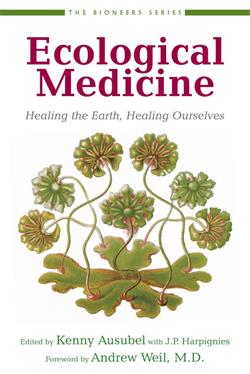
|
|
In light of the pandemic, Bioneers is releasing a free downloadable pdf of our 2004 Bioneers book: Ecological Medicine: Healing the Earth, Healing Ourselves, which could hardly be more relevant right now.
Ecological medicine is a unifying field that embodies the recognition that human and environmental health are one notion, indivisible. It’s also a metaphor for the healing process intrinsic to life that applies to both ecosystems and our bodies. Modern medicine’s separation from nature is at the root of many tragedies, both human and environmental, and the current pandemic is an object lesson in how disastrous that disconnection is to us as a society and civilization.
Get your copy here.
|
|
|
|







